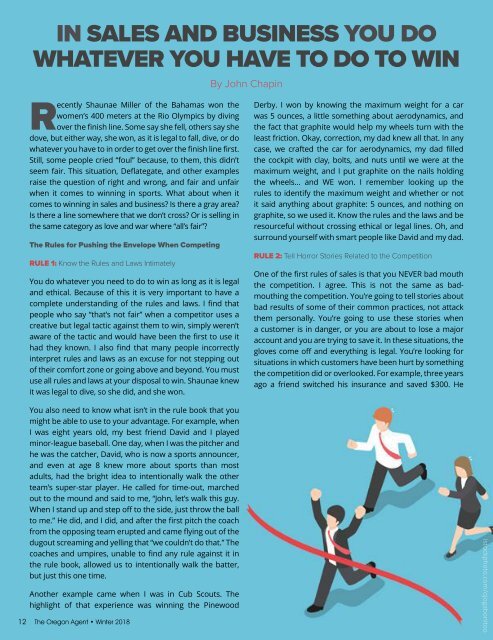Oregon Agent Winter 2018
Create successful ePaper yourself
Turn your PDF publications into a flip-book with our unique Google optimized e-Paper software.
IN SALES AND BUSINESS YOU DO<br />
WHATEVER YOU HAVE TO DO TO WIN<br />
By John Chapin<br />
Recently Shaunae Miller of the Bahamas won the<br />
women’s 400 meters at the Rio Olympics by diving<br />
over the finish line. Some say she fell, others say she<br />
dove, but either way, she won, as it is legal to fall, dive, or do<br />
whatever you have to in order to get over the finish line first.<br />
Still, some people cried “foul” because, to them, this didn’t<br />
seem fair. This situation, Deflategate, and other examples<br />
raise the question of right and wrong, and fair and unfair<br />
when it comes to winning in sports. What about when it<br />
comes to winning in sales and business? Is there a gray area?<br />
Is there a line somewhere that we don’t cross? Or is selling in<br />
the same category as love and war where “all’s fair”?<br />
The Rules for Pushing the Envelope When Competing<br />
RULE 1: Know the Rules and Laws Intimately<br />
You do whatever you need to do to win as long as it is legal<br />
and ethical. Because of this it is very important to have a<br />
complete understanding of the rules and laws. I find that<br />
people who say “that’s not fair” when a competitor uses a<br />
creative but legal tactic against them to win, simply weren’t<br />
aware of the tactic and would have been the first to use it<br />
had they known. I also find that many people incorrectly<br />
interpret rules and laws as an excuse for not stepping out<br />
of their comfort zone or going above and beyond. You must<br />
use all rules and laws at your disposal to win. Shaunae knew<br />
it was legal to dive, so she did, and she won.<br />
Derby. I won by knowing the maximum weight for a car<br />
was 5 ounces, a little something about aerodynamics, and<br />
the fact that graphite would help my wheels turn with the<br />
least friction. Okay, correction, my dad knew all that. In any<br />
case, we crafted the car for aerodynamics, my dad filled<br />
the cockpit with clay, bolts, and nuts until we were at the<br />
maximum weight, and I put graphite on the nails holding<br />
the wheels… and WE won. I remember looking up the<br />
rules to identify the maximum weight and whether or not<br />
it said anything about graphite: 5 ounces, and nothing on<br />
graphite, so we used it. Know the rules and the laws and be<br />
resourceful without crossing ethical or legal lines. Oh, and<br />
surround yourself with smart people like David and my dad.<br />
RULE 2: Tell Horror Stories Related to the Competition<br />
One of the first rules of sales is that you NEVER bad mouth<br />
the competition. I agree. This is not the same as badmouthing<br />
the competition. You’re going to tell stories about<br />
bad results of some of their common practices, not attack<br />
them personally. You’re going to use these stories when<br />
a customer is in danger, or you are about to lose a major<br />
account and you are trying to save it. In these situations, the<br />
gloves come off and everything is legal. You’re looking for<br />
situations in which customers have been hurt by something<br />
the competition did or overlooked. For example, three years<br />
ago a friend switched his insurance and saved $300. He<br />
You also need to know what isn’t in the rule book that you<br />
might be able to use to your advantage. For example, when<br />
I was eight years old, my best friend David and I played<br />
minor-league baseball. One day, when I was the pitcher and<br />
he was the catcher, David, who is now a sports announcer,<br />
and even at age 8 knew more about sports than most<br />
adults, had the bright idea to intentionally walk the other<br />
team’s super-star player. He called for time-out, marched<br />
out to the mound and said to me, “John, let’s walk this guy.<br />
When I stand up and step off to the side, just throw the ball<br />
to me.” He did, and I did, and after the first pitch the coach<br />
from the opposing team erupted and came flying out of the<br />
dugout screaming and yelling that “we couldn’t do that.” The<br />
coaches and umpires, unable to find any rule against it in<br />
the rule book, allowed us to intentionally walk the batter,<br />
but just this one time.<br />
Another example came when I was in Cub Scouts. The<br />
highlight of that experience was winning the Pinewood<br />
12 The <strong>Oregon</strong> <strong>Agent</strong> • <strong>Winter</strong> <strong>2018</strong><br />
istockphoto.com/ojogabonitoo


















